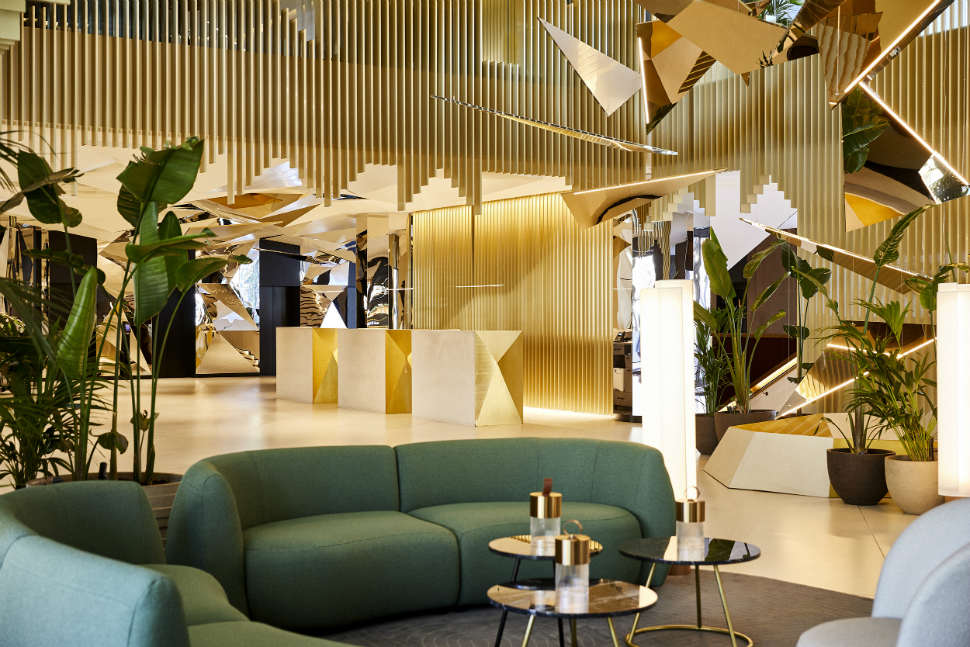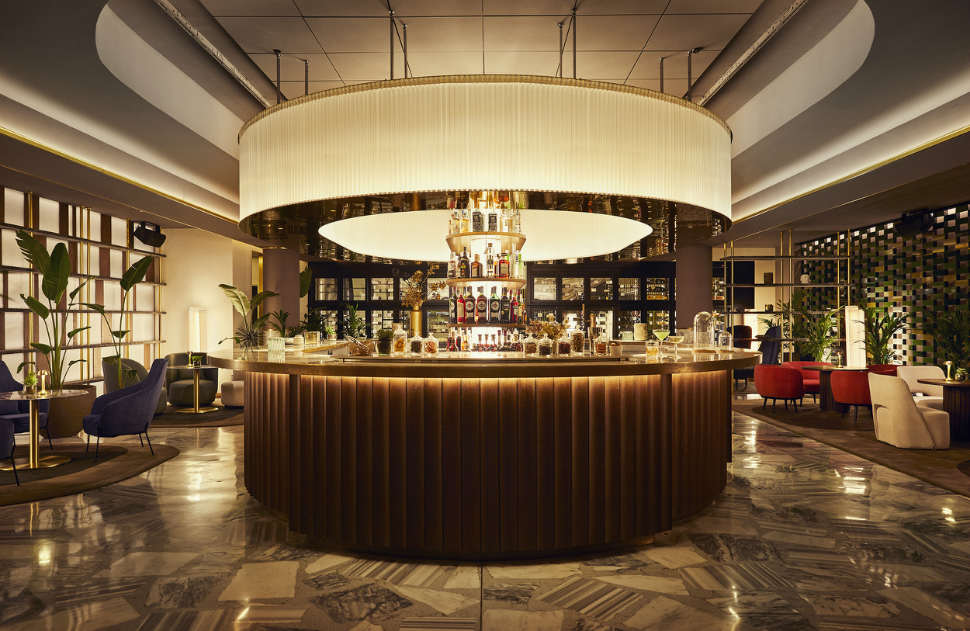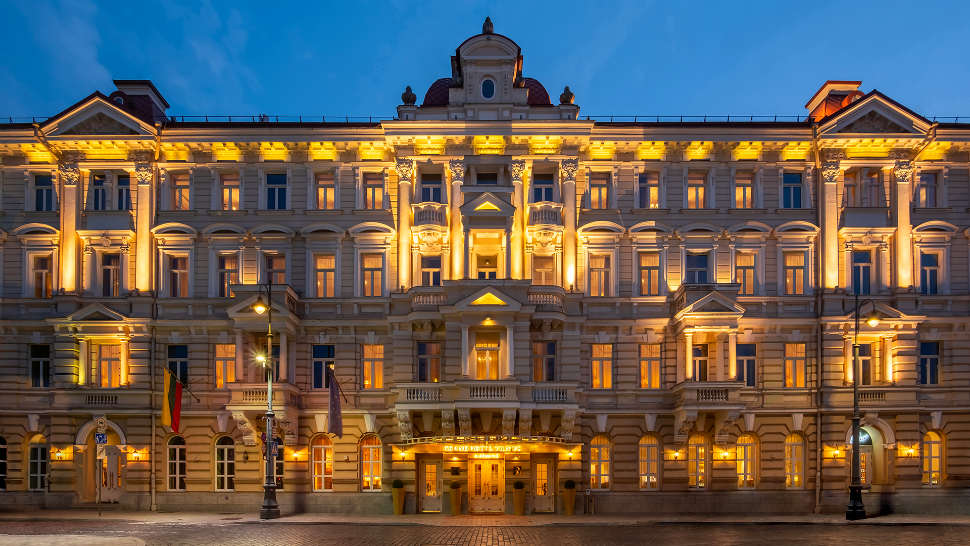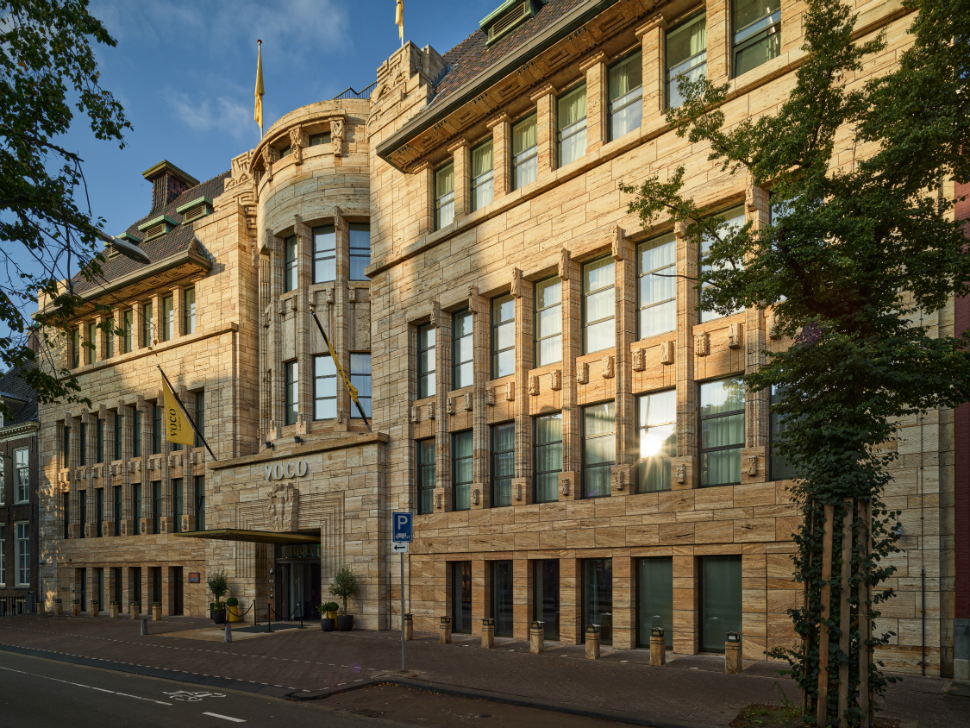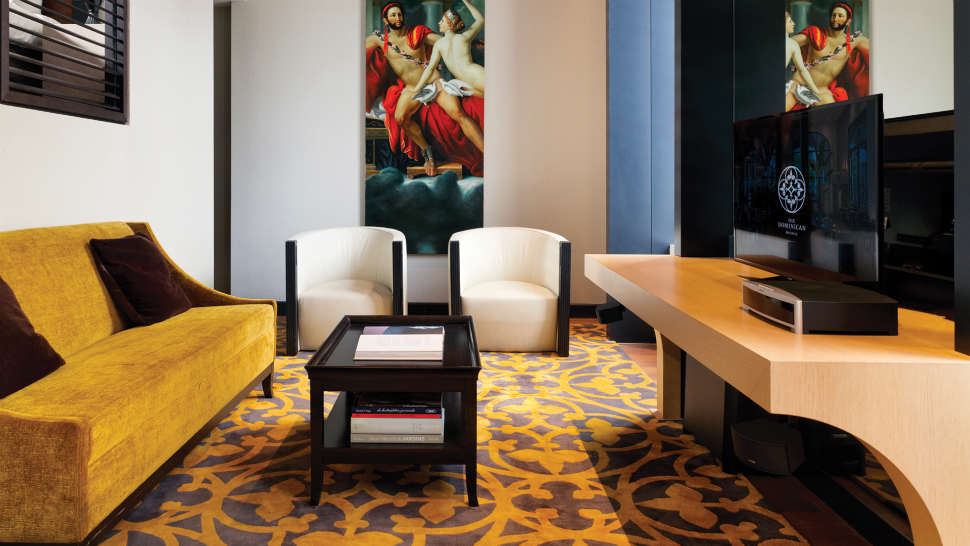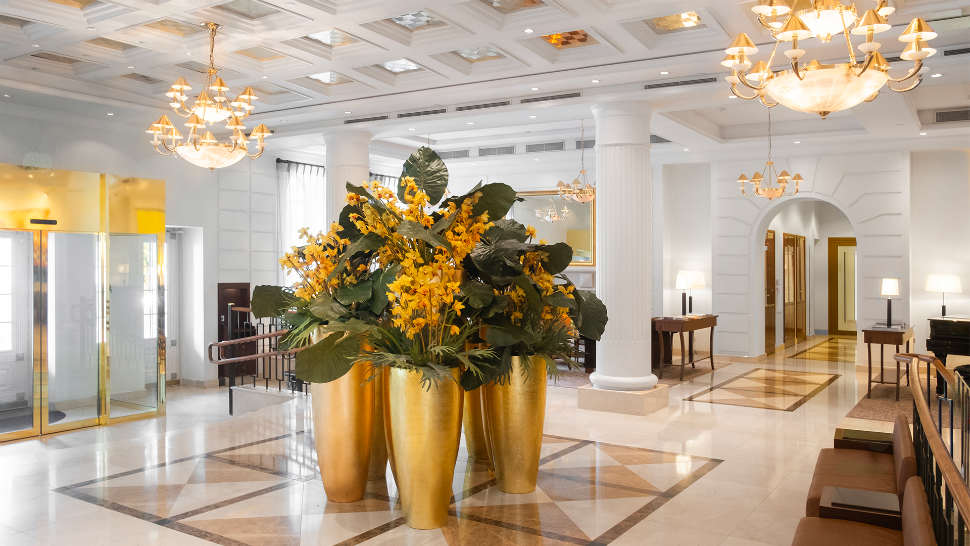Top trends from the European Hotel Awards 2024 in Copenhagen
Sustainable Trends Shine at the European Hotel Awards 2024 in Copenhagen
In 2024, sustainability is no longer just a talking point across the European hotel industry—it is the defining trend. During the European Hotel Awards 2024, held on October 14 at the iconic Radisson Collection Royal Copenhagen, the industry’s leading figures demonstrated that environmentally conscious practices are not only integral to the future of hospitality but also key to ongoing success. Whether looking at energy efficiency initiatives, sustainable sourcing, or a broader adoption of green architecture, this year’s awards in Copenhagen placed particular emphasis on those hoteliers leading the charge toward a greener future.
Hotels like the Ca’ Del Moro Wine Retreat from Italy garnered the coveted Green Award for its exemplary commitment to eco-conscious hospitality. Having reimagined the modern retreat through sustainable practices, including energy-efficient technologies and biodiverse grounds, this establishment sets a new standard for the entire industry. The Grand Hotel Del Mare in Bordighera, which won the Art of Hospitality award, also infused environmental awareness into its service philosophy, drawing inspiration from the natural beauty surrounding the Ligurian coastline to incorporate innovative water conservation and waste reduction techniques.
>
The focus on sustainability at the European Hotel Awards 2024 mirrors what is happening across Europe, where hotels are increasingly relying on renewable energy systems and adopting a zero-waste approach to appeal not only to eco-minded travelers but also to institutional investors with ESG (Environmental, Social, and Governance) policies. This year’s honorees presented crucial case studies in how sustainability and luxury can coexist seamlessly. From using locally sourced produce and biodegradable amenities to engaging their staff and guests in sustainability initiatives, the winners embodied practices designed to reduce environmental impact while preserving a high standard of comfort and indulgence.
One key takeaway from awards submissions and industry discussions this year was the growing demand for transparency in sustainability practices. It’s no longer sufficient to simply claim green credentials; discerning guests expect real-time metrics, certifications, and clear evidence of environmental actions in motion. Many hotels have thus invested in systems that monitor and reduce energy consumption, such as smart thermostats, LED lighting solutions, and water management technologies that prevent unnecessary waste. Radisson Collection Royal Copenhagen, which hosted the evening’s events, exemplifies this shift by integrating green architecture with cutting-edge energy-saving technologies, earning acclaim for its responsible practices while dazzling guests with understated luxury.
The trend extends beyond just energy efficiency. Sustainable building and design materials are fast becoming a priority, with many establishments adopting biophilic designs that merge natural elements like light, air, and plant life into their spaces, thus benefiting both the environment and the guest experience. The increased use of sustainable materials such as reclaimed wood, recycled metal, and non-toxic paints was also a notable shift in this year’s architecture-focused awards. Notable honorees in the design categories, like the Grand Hyatt Barcelona, exemplified how both aesthetic appeal and sustainability considerations can converge harmoniously to create spaces that enhance wellbeing while minimizing ecological footprints.
Meanwhile, institutions such as Quality Lodgings have taken strides to ensure their entire portfolio of properties aligns with environmental best practices. Their win as Hotel Group of the Year brought attention to the way hotel collections are scaling sustainable operations across multiple sites, balancing eco-design with long-standing traditions of comfort, culinary excellence, and world-class service. This commitment to sustainability demonstrates that environmental responsibility can—and should—be embedded into the business model of major hotel groups, making sustainability both a long-term investment and a competitive advantage.
There remains, of course, a notable intersection between sustainability and the guest journey. Increasingly, hotels are looking for ways to create eco-positive experiences by offering locally sourced, organic cuisine, eco-friendly spa treatments, and partnerships with community-based initiatives. For most award winners, sustainability is being reframed from an operational necessity to a holistic part of their brand narrative. Guests no longer see these initiatives as perks; they expect them. Properties like Huis Ter Duin in the Netherlands, which won the Grand Prestige award, use their prime coastal locations not just to deliver stunning water views but also as an opportunity to highlight conservation efforts, encouraging patrons to engage with preservation programs in environmentally sensitive regions.
As the 2024 awards demonstrated, the message is clear: the hospitality industry must not only embrace sustainable practices but champion them. Moving forward, we can expect these trends to maintain their momentum as mid-size hotels and luxury accommodations alike rise to the challenge of climate action. Hotels are evolving from being places of temporary stay to guiding forces in global efforts to protect and preserve nature—a shift reaffirmed in Copenhagen by this year’s spotlight on innovation and responsibility. The European Hotel Awards have truly become a beacon for leading-edge sustainability.
Cutting-edge design concepts
Design has long stood as a cornerstone of hospitality, where aesthetics and functionality merge to provide unforgettable guest experiences. The European Hotel Awards 2024, held at the Radisson Collection Royal Copenhagen, prominently highlighted this critical facet of the industry. This year’s edition placed a particular emphasis on cutting-edge design concepts—pushing the boundaries of what hotel design can achieve in terms of innovation, guest satisfaction, and alignment with broader trends in sustainability and technology. From avant-garde interiors to the seamless integration of cultural elements and modern conveniences, the honorees displayed a mastery of blending form and function like never before.
The award for Design Hotel of the Year went to the Grand Hyatt Barcelona, a property that has set new standards with its bold, forward-thinking aesthetics. This establishment uses artful design not just as a backdrop, but as a key element in shaping the entire guest experience. Its avant-garde approach combines sleek lines and futuristic materials with warm human elements, offering an atmosphere that is as comforting as it is visually striking. The Grand Hyatt Barcelona’s design team intricately wove usability into their fabric of creative expression, ensuring that the stunning interiors are also practical, guest-centered, and adaptable to various needs. Technology-infused rooms with adjustable lighting, voice-activated amenities, and ergonomic furniture made this hotel stand out on a global scale, clearly setting new benchmarks for luxury hotels everywhere.
One of the most innovative examples of the way design and functionality can harmoniously coexist came from the Italian Arte Nel Design, which clinched the Hotel Designer of the Year award for its iconic Cleopatra Room Suite. Arte Nel Design’s work in this suite redefined what it means to be daringly experimental while ensuring comfort is never compromised. Balancing indulgent luxury and artistic boldness, the Cleopatra Suite became a living piece of art. The suite’s sleek, minimalistic design was punctuated with statement pieces—from custom-made furniture to vibrant wall installations—all carefully curated to evoke sophistication with an edge. This brilliant marriage of artistic narrative and spatial utility was not just an aesthetic triumph, but a masterclass on how design can shape and elevate the hotel guest experience.
Another key player in the awards was the Grand Hotel Vilnius, part of Hilton’s Curio Collection, which tore down traditional design boundaries while maintaining cultural integrity. Awarded the title of Historic Hotel of the Year, the Vilnius property’s design honors Lithuanian architectural heritage while ushering in modern conveniences. Famed for its renaissance-style arches and preserved facades, the hotel masterfully contrasts old-world charm with discrete technological integrations, such as energy-efficient lighting systems modeled after historical candle holders and interactive room controls that seamlessly fit within the historic interiors. This balance of historic importance and modern enhancements invites guests to appreciate the past without sacrificing the comfort and luxury expected in today’s top-tier hotels.
Urban design also took center stage at the European Hotel Awards 2024, especially embodied by sly Berlin, winner of the Urban Hotel of the Year award. Located in one of Europe’s most architecturally diverse cities, Sly Berlin has embraced the rich history and multi-cultural fabric of the German capital. The hotel’s industrial chic aesthetic, with exposed brick walls, oversized windows, and concrete floors, pays homage to Berlin’s edgy, artistic undercurrent. While minimalistic in its essence, the design fosters an authentic, raw urban experience through handcrafted local furniture, art installations by Berlin-based artists, and immersive public spaces where guests can connect with the neighborhood’s culture. The hotel’s ability to blend Berlin’s historical landscapes with modern necessities truly exemplifies how hotels can become extensions of their surrounding environments.
The European Hotel Awards also showcased how design innovation extends beyond just visual appeal and into creating spaces that enhance guest wellbeing. The concept of biophilic design—where natural elements such as plants, natural lighting, and organic materials are used to foster a calming environment—emerged as a growing trend. Properties such as Huis Ter Duin, recognized for the Grand Prestige award, perfectly exemplified this movement. With its beachfront location, the hotel integrates natural textures, colors, and elements that appear effortless, creating serene, luxury spaces that embody both opulence and eco-consciousness. The interior design subtly mirrors the sea and dunes outside; soft blues and sandy hues dominate the palette, while large windows that welcome abundant natural light create an indoor environment that feels spacious, alive, and connected to its surroundings.
Ultimately, the European Hotel Awards 2024 in Copenhagen proved that design now plays an indispensable role in both maintaining brand identity and boosting guest satisfaction. Winning hotels across Europe illustrated that cutting-edge design isn’t just about aesthetics; it’s also about creating immersive, thoughtful spaces where guests experience elevated levels of comfort and engagement. Hotels like the Grand Hyatt Barcelona and Sly Berlin serve as apt examples of how design-forward thinking can set new standards in hospitality, while resetting the definitions of luxury, sustainability, and innovation. As we look ahead, it’s evident that design in the hospitality sector will continue to evolve, not merely for decoration, but as a tool to enhance functionality, environmental responsibility, and cultural expression. The European Hotel Awards are a testament to this ongoing revolution within the luxury hotel space.
Guest experience personalization
As the hospitality industry evolves, so too do the expectations of its guests, with personalization now taking center stage in delivering memorable experiences. The European Hotel Awards 2024 in Copenhagen revealed a prevailing trend that has been steadily growing in recent years: personalized guest experiences. This shift away from one-size-fits-all service models is transforming how hotels engage with guests, moving toward bespoke offerings tailored to individual preferences, needs, and even emotions. Through data-driven insights, innovative service techniques, and the careful curation of unique touches, hotels are creating environments where every guest feels like a VIP.
Winning establishments at the European Hotel Awards 2024 demonstrated that personalization is more than just remembering a guest’s name or favorite wine—it’s about crafting an entire journey, from pre-arrival to post-stay, that resonates with the individual. Whether through ultra-tailored services or curated local experiences, it is evident that personal touches have become a non-negotiable element in the future of European hospitality. For instance, the Grand Hotel Vilnius, expressed its commitment to personalized service by offering a variety of room design options and flexible dining choices that cater to guests’ dietary preferences, interests, and schedules. Personalized service is increasingly intertwining with technology, providing essential data to enhance these offerings consistently throughout a guest’s stay.
Technology, used discretely and thoughtfully, played a pivotal role in enhancing guest personalization in this year’s awards. Properties like the voco The Hague (recognized as Business Hotel of the Year) leveraged advanced CRM (Customer Relationship Management) systems to provide highly personalized experiences for their business clientele. By utilizing artificial intelligence and machine learning, the hotel anticipates guest needs, predicts preferences based on previous stays, and even offers seamless digital customization options before the guest even steps foot on the property. Incorporating mobile apps into a hyper-connected guest experience, voco The Hague enables visitors to tailor everything from room temperature to itinerary changes, all from their smartphones. It’s this level of attention to detail, thoughtfulness, and tech-driven flexibility that made the hotel a top-tier choice for business travelers seeking a personalized haven in a bustling city.
For other winners, such as Ca’ Del Moro Wine Retreat, recipient of the Green Award, personalization extended not only to the guest but also to their connection with nature and the surrounding community. Guests visiting this wine retreat could select from custom-curated nature walks, wine-tasting trips, and cooking classes that align with their interests, creating a deeply immersive and personally meaningful stay. This eco-conscious hotel further blurs the lines between personalization and sustainability, carefully crafting experiences linked to the local ecology while minimizing environmental impact. This nuanced approach sets a new benchmark for sustainability-conscious travelers, showing that personalization can extend beyond individual preferences to align with global trends toward sustainability and responsible tourism.
Another critical aspect highlighted in the 2024 awards was the growing demand for cultural personalization, where guests are seeking experiences that speak to the local fabric of the destination. The Dominican, winner of Historic Boutique Hotel of the Year, exemplified how establishments are incorporating localized designs, flavors, and traditions into a personalized narrative. By seamlessly blending the rich history of the building (once the site of a Dominican abbey) with modern cultural offerings such as local wine tastings and walks through hidden gems of nearby Brussels neighborhoods, The Dominican crafted an individualized connection between each guest and the city’s storied heritage. As hospitality continually shifts toward a more immersive, experiential model, providing culturally authentic and enriching experiences tailored to the guest’s curiosity has become increasingly vital.
Of equal importance, the European Hotel Awards 2024 illustrated that premium personalization, often synonymous with luxury stays, is increasingly being adopted by hotels across the spectrum, from lifestyle brands to boutique stays. For example, the Sly Berlin, voted Urban Hotel of the Year, offers bespoke urban exploration itineraries for guests keen to deep dive into Berlin’s vibrant arts scene. Whether attending exclusive gallery exhibitions or gaining after-hours access to iconic monuments, the hotel embraced personal curation on a cultural level, adding an element of exclusivity that helped it stand out among its peers. This balancing act between the cutting-edge lifestyle offerings and personal service exemplifies the future of urban hospitality, where immersion and originality take precedence over standardization.
Finally, the awards underscored the emotional resonance that personalized service creates for modern travelers. Properties like the legendary Hôtel Le Negresco in Nice, winner of Legend Hotel of the Year, offered ultra-personal experiences that felt bespoke, even within a luxurious and highly traditional framework. From highly individualized suite amenities based on personal tastes to tailored spa experiences, Le Negresco appealed directly to the refined tastes of its discerning clientele. Patrons of such iconic hotels often expect that their stays will be uniquely orchestrated to emphasize their personal preferences and desires. This drive to deliver a more intimate connection between the guest and the property ensures that each stay leaves a lasting imprint, a concept that is now transcending beyond luxury markets into lifestyle and eco-conscious hotels where the essence of personalization is shaping the future landscape.
In many ways, the emphasis on personalization witnessed at the European Hotel Awards 2024 reinforced an industry-wide realization: hotels are no longer just places where people sleep; they are becoming customizable destinations where guests’ individual journeys are anticipated, curated, and enhanced. This deeper connection between hotel and guest, where personal narratives are woven into every aspect of a stay, represents one of the industry’s most exciting evolutions. Moving forward, personalization will no longer be a luxury—it will be the new standard across European hospitality.
Tech-driven facility enhancements
As the hospitality landscape continues to evolve, the integration of technology into hotel facilities is reshaping the guest experience in profound ways. At the European Hotel Awards 2024 in Copenhagen, it became evident that cutting-edge, tech-driven facility enhancements are not only elevating convenience and luxury but also revolutionizing the way hotels operate and engage with their guests. The event highlighted a growing trend, showcasing various properties across Europe that have positioned technology at the heart of their service offering to meet the needs of modern travelers.
The increased focus on artificial intelligence (AI), automation, and smart technologies was a defining theme at this year’s ceremony. Hotels are no longer simply places to stay; they are becoming dynamic environments that anticipate and accommodate guest preferences through rapid, real-time data processing and seamless technological integrations. The award-winning hotels presented a new paradigm of smart hospitality, where technology harmonizes with comfort, creating a smoother, more personalized journey from check-in to checkout.
In the business sector, voco The Hague—a recipient of the Business Hotel of the Year award—demonstrated exemplary use of technology to enhance the guest experience for its corporate clientele. The hotel introduced AI-powered digital concierges, allowing business travelers to customize their stay via mobile devices. From adjusting room settings like temperature and lighting, to booking meeting spaces and arranging seamless transfers to and from corporate events, the technology embedded within voco The Hague offers unparalleled levels of customization and service. It’s a prime example of how tech-driven facility enhancements are simplifying and fine-tuning the guest experience, especially for today’s business traveler who operates in constantly changing environments.
Another standout example of using advanced technology was seen at the Grand Hyatt Barcelona, awarded Design Hotel of the Year. Beyond its stunning visual aesthetics, the property integrated cutting-edge features such as voice-activated room controls, automated check-in kiosks, and keyless entry systems, which enhance both convenience and security. The hotel further implemented AI-powered recommendations for local dining or cultural activities to deliver an experience that feels personally curated for guests based on their preferences and past behavior. By using technology as a tool for personalization, the Grand Hyatt Barcelona promotes an enhanced level of hospitality that leaves lasting impressions on its visitors.
The integration of Internet of Things (IoT) technologies also came to the fore during this year’s European Hotel Awards in Copenhagen. Hotels are utilizing IoT devices to create a seamless, fully connected experience where smart rooms adjust according to guest preferences. Features like fully customizable lighting, climate control that responds to live weather conditions, and automated window shades allow properties to offer rooms designed to meet specific guest demands before they even step through the door. For example, Sly Berlin, winner of Urban Hotel of the Year, embraced this trend by introducing sensor-equipped rooms, allowing guests to customize their in-room experience using mobile apps. As soon as someone reaches their room, pre-programmed settings transform the space to their liking, from the firmness of the pillows to the ambient lighting temperature.
This investment in tech-driven enhancements is not limited to the guest’s immediate experience but extends to operational efficiency as well. Many award-winning hotels are deploying predictive maintenance—using data collected from IoT sensors placed in everything from kitchen equipment to HVAC systems—to identify potential malfunctions before they impact the guest experience. Such innovations, as seen in premier properties like the Radisson Collection Royal Copenhagen (host of the 2024 European Hotel Awards), allow hotels to deliver an uninterrupted luxury environment while also boosting energy efficiency and reducing waste.
Moreover, advancements in data analytics are enabling hoteliers to foresee and plan for guest needs with greater precision. Machine learning algorithms analyze guest behavior and feedback from prior visits, helping hoteliers refine their offerings over time. The application of big data strategies is also empowering hotels to create more fluid operations, from optimizing inventory levels in restaurants to scheduling housekeeping staff based on real-time guest check-out patterns. This tech-driven agility ensures both an enhanced service experience for guests and maximized productivity behind the scenes.
However, as the European Hotel Awards 2024 showcased, technology in hospitality is no longer just about convenience—it’s about creating holistic and memorable guest experiences. Properties like Ca’ Del Moro Wine Retreat, which won the Green Award, used technology not just for operational efficiency but also to complement its sustainability efforts. The retreat integrates energy-saving technologies such as smart lighting and water optimization systems with guest-facing apps that inform visitors on how they can contribute to reducing their environmental footprint during their stay. This emerging trend demonstrates how tech and sustainability are interlinked as the next frontier in responsible luxury hospitality.
The future of hotel design and operation, as highlighted at the awards, is clearly being shaped by tech-driven innovations that balance luxury with sustainability, efficiency, and personalization. Whether it’s automated in-room amenities, AI-infused guest services, predictive maintenance systems, or IoT-enhanced rooms, these advances are redefining the benchmarks for excellence within the European hospitality scene. The gathering in Copenhagen proved to be a celebration not only of the latest industry achievements but of the visionary hotels that are embracing these technologies to deliver transformative experiences for their guests.
Rising demand for boutique stays
The global hotel industry is experiencing a notable shift as travelers increasingly gravitate toward curated, intimate accommodations that prioritize authenticity over scale. This was particularly evident during the European Hotel Awards 2024 in Copenhagen, which not only celebrated excellence in hospitality but also underscored the rising demand for boutique stays. This trend, which has been gathering momentum for several years, is redefining the core of the luxury hospitality sector, paving the way for more personalized, distinct guest experiences.
At the forefront of this movement are boutique hotels—smaller properties recognized for their unique design, character, and personalized services, distinguishing themselves from the often more standardized offerings of larger hotel chains. Unlike their larger counterparts, these boutique properties thrive on delivering highly individualized experiences, which directly appeals to the modern, discerning traveler. As many award winners at the European Hotel Awards 2024 brilliantly demonstrated, more guests are seeking out intimate environments where local charm and distinctive aesthetics blend with high-end comforts to create stays that feel anything but generic.
Hotels like The Dominican in Brussels, which received the award for Historic Boutique Hotel of the Year, embody the ethos driving this demand. The property cleverly incorporates its historical roots—set within the remnants of a former abbey—while offering sophisticated modern amenities that cater to the tastes of today’s cosmopolitan traveler. Every detail, from the hotel’s décor to its curated cultural programming, is designed to provide an immersive experience that reflects the local heritage while ensuring contemporary comforts are never compromised. This balance resonates with guests who crave a true sense of place, whether they’re on a weekend city break or a longer cultural retreat.
Another standout in the boutique category was Hostal de La Gavina, honored as Iconic Hotel of the Year for its location on Spain’s Costa Brava. This legendary property, renowned for its Art Deco charm and secluded ambiance, exemplifies why boutique hotels are capturing the imagination of travelers. With fewer rooms, the hotel fosters an intimate, almost home-like atmosphere that allows for highly personalized service. This element of exclusivity—combined with a deep connection to the local environment—has become a hallmark of today’s boutique hotels, allowing them to differentiate themselves from larger corporate chains and attract a clientele that values experience over scale.
The rising appeal of boutique stays can also be linked to the ongoing trend of experiential travel. Guests are no longer satisfied merely with luxury accommodations; they want to feel a connection to the local culture, history, and geography, all while enjoying a sense of exclusivity and tailored service. Properties like Sly Berlin, which won Urban Hotel of the Year, highlight how boutique hotels in cosmopolitan cities are responding to this demand by delivering hyper-localized experiences. Offering a stylishly industrial design reflective of Berlin’s vibrant creative scene, the hotel provides a rich narrative that plays directly into the city’s culture while offering curated events, such as artist meet-and-greets and insider city tours that connect guests to the local environment.
While boutique hotels have traditionally been associated with leisure travel, their appeal to business travelers is also on the rise, and properties are responding accordingly. Hotels like voco The Hague, celebrated as Business Hotel of the Year, are challenging conventional perceptions of what a business hotel can offer. By keeping a boutique ethos—blending innovative meeting spaces with bespoke amenities—voco The Hague ensures personal touches and a tranquil ambience that larger corporate hotels often struggle to replicate. Despite the focus on serving professional guests, the hotel succeeds in maintaining an individual character while providing practical, high-tech services, attracting business travelers who value both productivity and comfort.
The surge in demand for boutique hotels also complements broader industry trends, particularly the increasing emphasis on sustainability and local engagement. Many boutique establishments use their smaller scale to implement eco-friendly practices more easily, creating sustainable experiences that not only enhance guest satisfaction but also contribute to their environmental profiles. Hotels like Ca’ Del Moro Wine Retreat, which took home the Green Award, integrate sustainability into every layer of the guest experience, from the organic vineyard tours to eco-conscious building materials. Guests who choose boutique hotels often seek these types of thoughtful, responsible travel options, making sustainability a crucial selling point for this segment of the market.
This growing preference for boutique stays reflects a larger shift in the hospitality industry, where travelers are moving away from mass tourism and gravitating toward more intimate, bespoke experiences. The European Hotel Awards 2024 showcased that boutique properties are not only meeting this demand but redefining the standards of luxury, offering a more personalized journey that is deeply rooted in local culture and enhanced by meticulous attention to detail. As this trend continues to shape the future of hospitality, boutique hotels are expected to become ever more attractive to both leisure and business travelers seeking meaningful, bespoke experiences in an increasingly globalized world.




